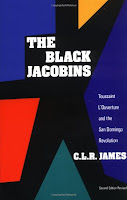One of those book that I'm amazed that I hadn't already read - it's been around me for years and years, and somehow I'd begun to imagine that I'd read it. But I hadn't, though I had read a novelisation of the life of Henri Christophe, which covered some of the same material.
It's absolutely brilliant history, with a great understanding of the balance between individual heroes (and villains) and social forces. James also has a really good grasp of the limitations of the heroes too, especially Toussaint L'Overture, who is the central character of the Haitian revolution. The writing is beautiful - even the production of the book, with detailed numbered footnotes at the foot of each page (not in some unfindable section at the back) is a pleasure.
I must admit that there were some parts where I got a bit confused. Suddenly there seemed to be too many characters on stage, and I rather lost track of who was who - some character cards would have helped here, I think. And the twists and turns of the wars and battles, especially during the revolutionary period, are really confusing - the role of the British, and the Americans, is well set out but even so it's hard to follow.
But the narrative takes off again during the final round, when Napoleon sends a French army to reconquer the island and reimpose slavery. I must say that I hadn't appreciated what a nasty, reactionary, racist Bonaparte was. The atrocities committed by the planters and the French soldiers, often with the express intention of creating terror and despair in the revolting ex-slaves, were appalling. I know comparisons with the Nazis are always invidious, but I couldn't help thinking that German civilians didn't ever turn up to watch mass executions as a form of entertainment.
Anyway, this is a great book, and I'm sorry it took me so long to get round to it. I understand it was also turned into a play, which would be interesting to see.
Wednesday, September 25, 2019
Subscribe to:
Post Comments (Atom)


No comments:
Post a Comment